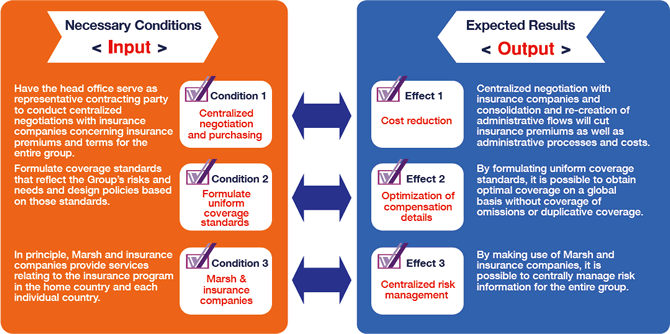You are leaving Marsh Broker Japan's website. Marsh Broker Japan has provided this link for your convenience, but assumes no responsibility for the content, links, privacy policy or security policy of the website.
Do you wish to leave our website?
Background to Development
A global insurance program is a method of arranging non-life insurance policies developed for global businesses in Europe and the United States. Today, global programs are used by many global businesses in Europe and the United States. Previously, global companies arranged individual non-life insurance policies in each country around the world where they had operations, but this earlier method presents three difficulties from the perspective of risk management.
First, by arranging individual insurance policies, it is not possible to generate the benefits of scale when negotiating insurance premiums with insurers and cost efficiency is low. Second, it is difficult to determine the details of compensation and total limits of liability are set in each region, making omissions in coverage and duplicative coverage more likely to occur. Also, even if group coverage standards are established and attempts are made to apply those standards uniformly throughout the world, this can be difficult because of coverage regulations*1 and insurance circumstances in each country. Third, the insurers, agencies, and brokers engaged are different in each country and region, making it difficult to conduct centralized risk management and risk control on a global basis.

Global insurance programs were created to resolve these three issues and make comprehensive insurance arrangements for global risks including group companies and overseas branches located in countries around the world. Global insurance programs can be created for each type of insurance including logistics insurance, non-life insurance, and fire and loss of profit insurance, but such programs first became common in the logistics insurance field because of the unique characteristics of the risks. After shipment from a plant, the products and semi-finished goods that are the subjects of logistics insurance can travel not just to one country, but to many countries and regions around the world before delivery to the buyer. It is not reasonable to make separate insurance arrangements in each country and region for this type of fluid risk, and it is believed that since the three issues discussed above also arise and in many cases coverage regulations do not apply, global insurance programs first became common in the logistics insurance field.
*1. Coverage regulations are laws and regulations in some countries that prohibit or restrict direct coverage of domestic risks by foreign insurers in overseas third countries that do not have a domestic business license in order to protect domestic policyholders and nurture the domestic insurance industry.
Global Insurance Programs
Background to Development
Structures and Functions
Roles and Functions of each Participant
Effects of Introduction
Frequently Asked Questions
